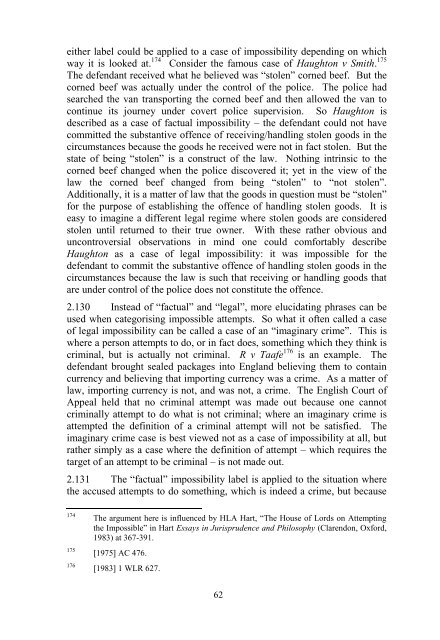Consultation Paper on Inchoate Offences - Law Reform Commission
Consultation Paper on Inchoate Offences - Law Reform Commission
Consultation Paper on Inchoate Offences - Law Reform Commission
You also want an ePaper? Increase the reach of your titles
YUMPU automatically turns print PDFs into web optimized ePapers that Google loves.
either label could be applied to a case of impossibility depending <strong>on</strong> whichway it is looked at. 174 C<strong>on</strong>sider the famous case of Haught<strong>on</strong> v Smith. 175The defendant received what he believed was “stolen” corned beef. But thecorned beef was actually under the c<strong>on</strong>trol of the police. The police hadsearched the van transporting the corned beef and then allowed the van toc<strong>on</strong>tinue its journey under covert police supervisi<strong>on</strong>. So Haught<strong>on</strong> isdescribed as a case of factual impossibility – the defendant could not havecommitted the substantive offence of receiving/handling stolen goods in thecircumstances because the goods he received were not in fact stolen. But thestate of being “stolen” is a c<strong>on</strong>struct of the law. Nothing intrinsic to thecorned beef changed when the police discovered it; yet in the view of thelaw the corned beef changed from being “stolen” to “not stolen”.Additi<strong>on</strong>ally, it is a matter of law that the goods in questi<strong>on</strong> must be “stolen”for the purpose of establishing the offence of handling stolen goods. It iseasy to imagine a different legal regime where stolen goods are c<strong>on</strong>sideredstolen until returned to their true owner. With these rather obvious andunc<strong>on</strong>troversial observati<strong>on</strong>s in mind <strong>on</strong>e could comfortably describeHaught<strong>on</strong> as a case of legal impossibility: it was impossible for thedefendant to commit the substantive offence of handling stolen goods in thecircumstances because the law is such that receiving or handling goods thatare under c<strong>on</strong>trol of the police does not c<strong>on</strong>stitute the offence.2.130 Instead of “factual” and “legal”, more elucidating phrases can beused when categorising impossible attempts. So what it often called a caseof legal impossibility can be called a case of an “imaginary crime”. This iswhere a pers<strong>on</strong> attempts to do, or in fact does, something which they think iscriminal, but is actually not criminal. R v Taafe 176 is an example. Thedefendant brought sealed packages into England believing them to c<strong>on</strong>taincurrency and believing that importing currency was a crime. As a matter oflaw, importing currency is not, and was not, a crime. The English Court ofAppeal held that no criminal attempt was made out because <strong>on</strong>e cannotcriminally attempt to do what is not criminal; where an imaginary crime isattempted the definiti<strong>on</strong> of a criminal attempt will not be satisfied. Theimaginary crime case is best viewed not as a case of impossibility at all, butrather simply as a case where the definiti<strong>on</strong> of attempt – which requires thetarget of an attempt to be criminal – is not made out.2.131 The “factual” impossibility label is applied to the situati<strong>on</strong> wherethe accused attempts to do something, which is indeed a crime, but because174175176The argument here is influenced by HLA Hart, “The House of Lords <strong>on</strong> Attemptingthe Impossible” in Hart Essays in Jurisprudence and Philosophy (Clarend<strong>on</strong>, Oxford,1983) at 367-391.[1975] AC 476.[1983] 1 WLR 627.62
















